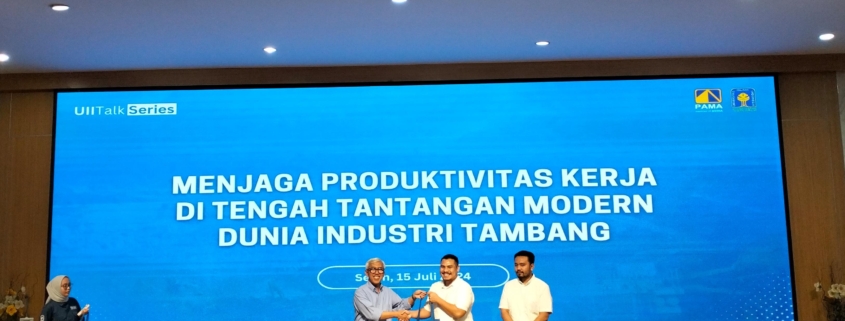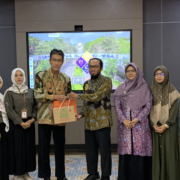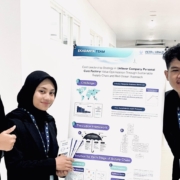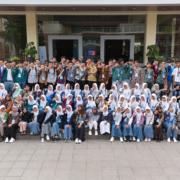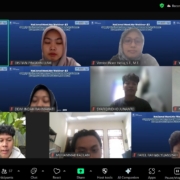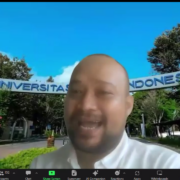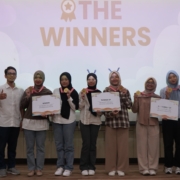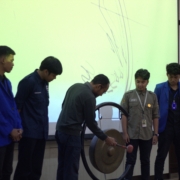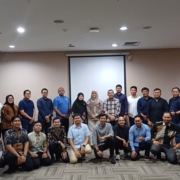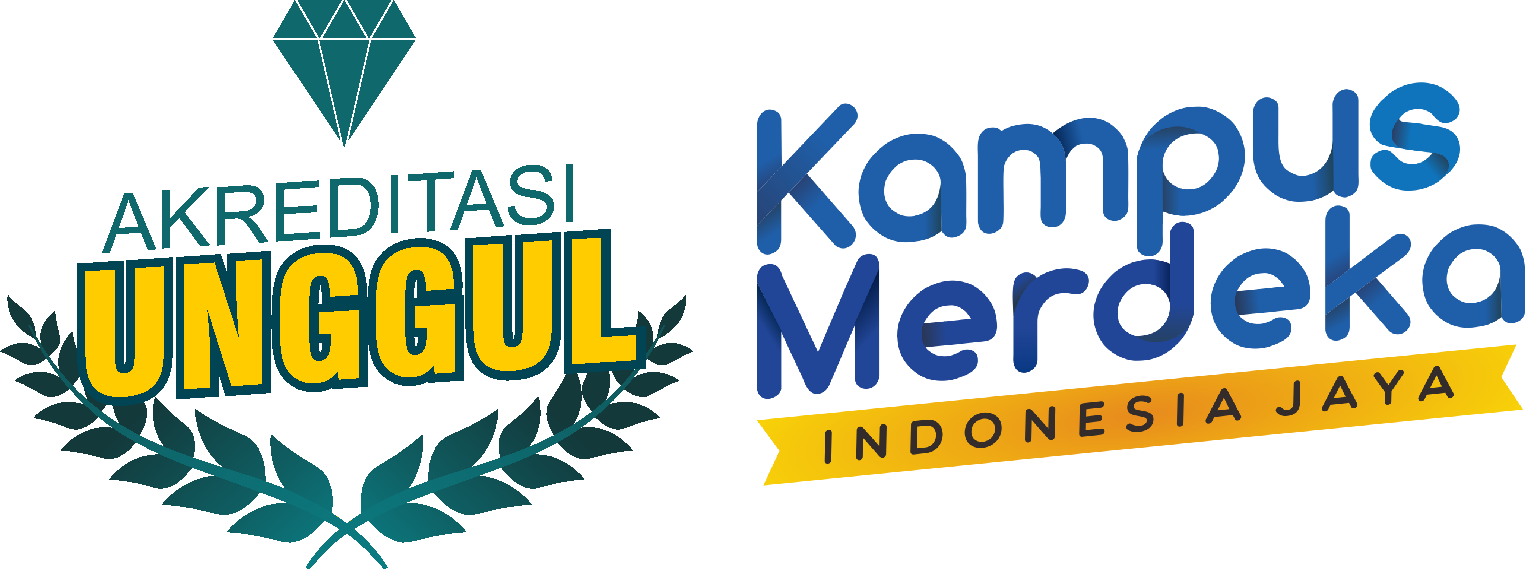UII Talk: Maintaining Work Productivity Amidst Modern Challenges in the Mining Industry
The seminar series ‘UII Talk Series’ returned on Monday (15/07) at the Theatrical Room, Prof. Dr. Sardjito Public Lecture Building, UII. The Directorate of Partnership or International Affairs Office of UII collaborated with PT Pamapersada Nusantara as a resource person in the seminar which was divided into three sessions. Vice Rector for Networking & Entrepreneurship Ir. Wiryono Raharjo, M.Arch., Ph.D., also attended the opening of this seminar. PT Pamapersada brought speakers from the Recruitment & Selection Head, Hendra Maraden, S.Psi, and Recruitment & Selection Analyst, Arika Zulfitri Karim, S. Psi, who discussed the topic of Maintaining Work Productivity Amid Modern Challenges in the Mining Industry. As for lecturers from the Industrial Engineering Study Programme, Bambang Suratno, MT, ST, Ph.D., who will review academic perspectives on productivity improvement with Seven Tools and New Seven Tools. This activity invites UII students so that they can enrich their knowledge and expand their professional network.
The event started at 08.30 WIB with Rani Septyani as the MC and Putri Dwi Annisa, S.T, M.Sc., as the moderator. It was opened with the recitation of Quran verses by Muhammad Arsil Arsor from the Ahwal Syakhsiyah Study Program, the presentation of PT Pamapersada Nusantara’s profile, as well as remarks from Ir. Wiryono Raharjo. In his speech, he expected UII students to strengthen the alumni network, “I think, this is a prospect for all of you in the future to enter this world. Because especially from Industrial Technology (FTI), yes. I think there can be a lot of discussion, but hopefully it can be a good start for the collaboration of Universitas Islam Indonesia with PT Pamapersada and hopefully among the participants can hang in there, so that it can strengthen the UII alumni network in the mining world” he said. Furthermore, the handover of souvenirs and documentation with the participants.
Session 1: Building Culture to Increase Productivity in Mining Contractor Industry Challenges
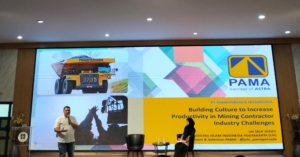
In this first session, Hendra Maraden, S.Psi, from the Recruitment & Selection Head will present Building Culture to Increase Productivity in Mining Contractor Industry Challenges. In the mining sector, the company has become the largest production mining contractor in the world that produces more than one billion BCM (Bank Cubic Meter). With the increasing prospects of this company, PT Pamapersada is more selective in managing human resources by paying attention to the company’s system. Realizing that people come and go, the company built an integrated system, “To be a big company, besides people, we must have a strong system. It must be systematized because people come and go, but the system must keep running” he said. To increase the productivity of its employees, the company is digitizing, namely the PAMA Integrated System which provides the needs of workers.
That way, PT Pamapersada Nusantara proves its productivity by moving forward from what was previously only a heavy equipment rental business to a mining contractor that has been integrated with various operating points. Not only in terms of improved systems, but the company also opens space for employees to develop, such as holding hobby clubs and receiving constructive suggestions for the company. Then, the moderator gave directions to enter the question and answer session.
Session 2: Flow of Recruitment Process in Mining Companies
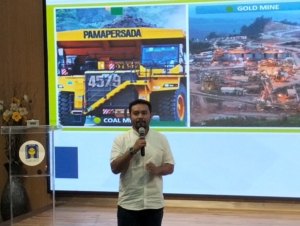
Next, Arika Zulfitri Karim, S.Psi, from the Recruitment & Selection Analyst field, explained the flow of the recruitment process at PT Pamapersada Nusantara. The company supports its employees to work productively and innovatively with synergy between employees and management. With the number of employees reaching 30 thousand, the company continues to improve its functions. The recruitment team is actively looking for the best seeds to maintain the company’s value. “Well, before PAMA people are finally productive, we must first look for people whose DNA is the same as PAMA. Therefore, we recruit ourselves who ultimately have to look for people like that where we have our own criteria,” he said.
He also advised potential applicants to understand the essence of the company before applying. Arika explained that the flow of the application process at PT Pamapersada is different for D3 and S1, and mentioned the preparation and qualifications required by applicants.
Session 3: Seven Tools and New Seven Tools
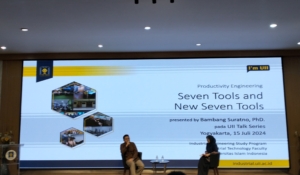
Then, Bambang Suratno, MT, ST, Ph.D., as a lecturer from the Industrial Engineering Study Programme started the third session which will review academic perspectives on increasing productivity with Seven Tools and New Seven Tools. The digitalisation carried out by PT Pamapersada Nusantara requires the concept of supporting tools in analyzing related data. Seven Tools are statistical equipment used to solve work problems and seek improvements in work results and processes that are usually needed. Then, he explained that understanding seven tools can help adjust which tools are right for ideas in problem solving. Then there are the New Seven Tools that are commonly used for office management, such as analyzing risks in companies.
He said that these two methods complement each other, ‘So, the two Seven Tools complement each other, which initially (Old Seven Tools) was used more for production related to numerical data. If the new one (New Seven Tools) is to the upper management problem,’ he explained. Furthermore, it was explained that in its use, the latest Seven Tools were used at the beginning of the research, then numerical data was sought using the old Seven Tools.
The third session ended after a short question and answer session from the participants to the speakers and continued with the closing of this seminar series by the MC. From this meeting, it is hoped that it can increase the productivity of UII students, as well as add insight to participants and help prepare themselves for a better work environment.
Rani Novalentina

